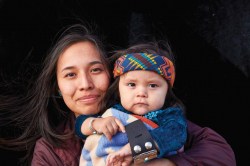
Brief Study Summary
- The +Language is Medicine (+LiM) study seeks to prevent developmental delays in Diné (Navajo) toddlers through early intervention focused on “language nutrition” lessons delivered by trained and supervised Family Health Coaches.
- The study began enrolling parents/caregivers of toddlers age 9-24 months postpartum in January 2023 and aims to enroll approximately 20 families in the Northern Agency / Shiprock area.
Background information
- Native American toddlers and preschoolers experience a high rate of developmental delay (DD) that contributes to decreased kindergarten readiness and often results in the need for special education services. Children with DD are at high risk for preventable health issues, such as obesity and behavior problems.
- The early childhood period is a critical time for caregiver-child bonding to promote development and to point children on a positive developmental and health trajectory. DD can be remediated with developmental therapies and caregiver coaching intended to boost the frequency of quality, language-rich interactions between caregivers and their young children.
- Phase 1 of this study included research and curriculum development with close coordination with a Community Advisory Board. The home-visiting curriculum is designed to help parents and caregivers learn ways of interacting with their children to promote language development during regular family and cultural routines.
- Phase II includes the current and ongoing pilot-testing and evaluation of the curriculum.
What we are doing
- Parent/caregiver participants receive 5 lessons delivered by a Diné Family Health Coach. lessons promote: reciprocal and responsive communication, following your child’s lead, shared book reading, encouraging communication through pretend play, and incorporating Native language into daily routines.
- The two Diné Family Health Coaches, trained by a licensed Diné speech language pathologist, also administer surveys and developmental assessments.
- Participation lasts 5 to 6 months.
How this will help improve health in the community
- This work has the potential to reduce the high incidence of DD amongst Diné toddlers and reduce the number of children who need IDEA Part C early intervention and special education services.
- This pilot study will encourage positive parenting practices and foster kindergarten readiness.
Contact: Josh Allison-Burbank jalliso8@jhu.edu